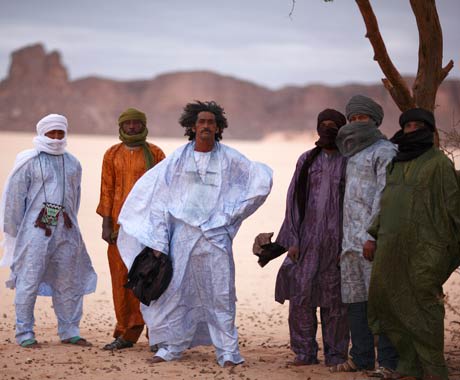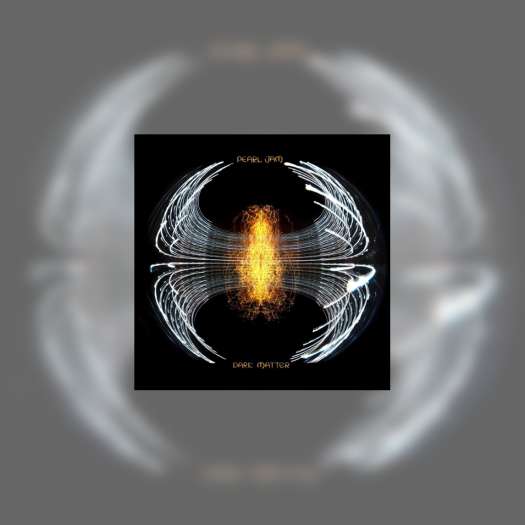To call Tinariwen survivors would be a gross understatement. A group of nomadic musicians from the Sahara desert region of Mali, Tinariwen's ever (r)evolving cast has endured extreme political strife in their homeland, the death of two of their members and the recent arrest of guitarist Abdallah Ag Lamida, who was taken in for "playing the devil's music." Celebrating their 35th year as a musical group, Tinariwen have once again been forced to flee their country, relocating to Joshua Tree, California to record their stunningly ethereal sixth full-length, Emmaar. Bassist Eyadou Ag Leche spoke with Exclaim!, through a translator, about his band's recent struggles, the transcending language of music and their mysterious ban from Canada.
Where are we talking to you from?
From Paris, we are just coming back from NYC and a full promo week there.
Although your band has found significant acclaim in North America, I find that most people still find Tinariwen very mysterious and exotic. Can you give some background on how your band was formed?
We've been always playing music, it is part of the Touareg culture, of our way of life. Since the early '60s and the new borders, the political situation for our people has never been safe to live in peace, we have been facing long periods of exile.
Can you talk about the obstacles your band had to overcome to get your music heard across the world?
The obstacles of the current situation are not only towards working musicians but towards all of our community. We want our music to be help spread the message about our people suffering, looking for freedom and peace, but our songs have always been also about love, our environment, poetry... we want both messages to be spread.
Tell me a bit about the recording of Emmaar, your new album.
We recorded Emmaar in the desert of Joshua Tree, live recording in a house, as our Sahara was not secured for our crew, and choosing a desert was a natural choice for us. We invited musicians we met during our previous tours, same as we did with TV on the Radio for [2011's] Tassili, our previous album. We invited Saul Williams, Josh Klinghoffer [of Red Hot Chili Peppers], Matt Sweeney [of Chavez], Fats Kaplin, and Vance Powell mixed the album. Recording far from home was new for us but doing it in a desert was a help for feeling good, thanks to the landscapes, and the freedom feelings.
Can you talk about working with these musicians?
We invited them as we met them on tour, it is always a pleasure to meet other musicians, sharing experience and music feelings and watching them getting into our music, we have great fun jamming and composing with other musicians.
Many of the musicians you played with can't speak French. How do you communicate with them?
In our Touareg culture, in the desert, we are used to speaking with the eyes. Talking is not always necessary. Music is a universal language and this is through this language we communicate with musicians from other countries, which works great!
Where does the title Emmaar come from?
Emmaar means the heat of the desert breeze and the heat while approaching a fire camp; far enough to not get burnt and close enough to feel the heat. It is a metaphor of the situation happening in our lands; the tension before the war, the revolution. The album is about the situation in our lands, the freedom and peace we are looking for, and always about love, poetry and our environment; the desert.
A lot of North African music seems to be heavily based on American blues music. What is it about the blues that influences you and so many musicians in your region?
American blues themes are close to ours; suffering, love, exile. This music talk to our souls.
What would you say is the biggest misconception North Americans have about your band?
Maybe that our songs are only about the conflict in our lands. Our songs are also about love, nature.
Mali is currently facing overwhelming political strife, can you educate us on what's happening and how it's affected your band?
It all started in the early '60s after the decolonization and Malian borders drawn by France. Since then, the Touareg community, Northern Mali, have been facing critical economical difficulties; no help from Bamako, no recognition of independence of our territory Asawad. Several rebellions happened, no evolution and the current conflict is the result of these past decades. Meanwhile, Islamists have taken advantage of the troubled situation while our community is only looking for freedom and peace. When not touring these past months, some of us have been staying in Southern Algeria; safer place, others moving between south Algeria, Northern Mali, Niger, Mauritania.
What was your impression of Canada and the Canadian people the first time you visited?
We always love meeting other cultures and their people. We were pleased to meet Canadian people of course. Unfortunately, we've banned from the country in 2011 and do not know the reason why.
Can you explain how you found out that you were banned?
We were supposed to play shows in 2011, several music festivals, while we were touring our album Tassili but we've been refused the visas. We never had any further explanations, and no ones knows if we could get another chance to come. It is sad, we want to meet again Canadians and many Canadians ask for it.
You were raised in the Sahara desert region where you were surrounded by open space. Your album artwork and videos often embrace that natural beauty. Do you ever feel claustrophobic touring North American and Europe?
We feel always nostalgic about our land and our environment. It is part of us; Assouf, our nostalgia.
Your band has written about "Assouf" on your last album. Can you elaborate on what "Assouf" means?
Assouf means the nostalgia, it is the thoughts of our people, home... linked to the exile.
You and your bandmates have experienced and witnessed much strife in your homeland. How does your band stay positive and hopeful in the light of this peril?
We want to spread the message that our people have been suffering for a long time now, it is important for us and our community that the world knows about it. We hope political agreements will be found soon though, but nothing is done still, we only want freedom, peace and respect for our rights and our territory.
Where are we talking to you from?
From Paris, we are just coming back from NYC and a full promo week there.
Although your band has found significant acclaim in North America, I find that most people still find Tinariwen very mysterious and exotic. Can you give some background on how your band was formed?
We've been always playing music, it is part of the Touareg culture, of our way of life. Since the early '60s and the new borders, the political situation for our people has never been safe to live in peace, we have been facing long periods of exile.
Can you talk about the obstacles your band had to overcome to get your music heard across the world?
The obstacles of the current situation are not only towards working musicians but towards all of our community. We want our music to be help spread the message about our people suffering, looking for freedom and peace, but our songs have always been also about love, our environment, poetry... we want both messages to be spread.
Tell me a bit about the recording of Emmaar, your new album.
We recorded Emmaar in the desert of Joshua Tree, live recording in a house, as our Sahara was not secured for our crew, and choosing a desert was a natural choice for us. We invited musicians we met during our previous tours, same as we did with TV on the Radio for [2011's] Tassili, our previous album. We invited Saul Williams, Josh Klinghoffer [of Red Hot Chili Peppers], Matt Sweeney [of Chavez], Fats Kaplin, and Vance Powell mixed the album. Recording far from home was new for us but doing it in a desert was a help for feeling good, thanks to the landscapes, and the freedom feelings.
Can you talk about working with these musicians?
We invited them as we met them on tour, it is always a pleasure to meet other musicians, sharing experience and music feelings and watching them getting into our music, we have great fun jamming and composing with other musicians.
Many of the musicians you played with can't speak French. How do you communicate with them?
In our Touareg culture, in the desert, we are used to speaking with the eyes. Talking is not always necessary. Music is a universal language and this is through this language we communicate with musicians from other countries, which works great!
Where does the title Emmaar come from?
Emmaar means the heat of the desert breeze and the heat while approaching a fire camp; far enough to not get burnt and close enough to feel the heat. It is a metaphor of the situation happening in our lands; the tension before the war, the revolution. The album is about the situation in our lands, the freedom and peace we are looking for, and always about love, poetry and our environment; the desert.
A lot of North African music seems to be heavily based on American blues music. What is it about the blues that influences you and so many musicians in your region?
American blues themes are close to ours; suffering, love, exile. This music talk to our souls.
What would you say is the biggest misconception North Americans have about your band?
Maybe that our songs are only about the conflict in our lands. Our songs are also about love, nature.
Mali is currently facing overwhelming political strife, can you educate us on what's happening and how it's affected your band?
It all started in the early '60s after the decolonization and Malian borders drawn by France. Since then, the Touareg community, Northern Mali, have been facing critical economical difficulties; no help from Bamako, no recognition of independence of our territory Asawad. Several rebellions happened, no evolution and the current conflict is the result of these past decades. Meanwhile, Islamists have taken advantage of the troubled situation while our community is only looking for freedom and peace. When not touring these past months, some of us have been staying in Southern Algeria; safer place, others moving between south Algeria, Northern Mali, Niger, Mauritania.
What was your impression of Canada and the Canadian people the first time you visited?
We always love meeting other cultures and their people. We were pleased to meet Canadian people of course. Unfortunately, we've banned from the country in 2011 and do not know the reason why.
Can you explain how you found out that you were banned?
We were supposed to play shows in 2011, several music festivals, while we were touring our album Tassili but we've been refused the visas. We never had any further explanations, and no ones knows if we could get another chance to come. It is sad, we want to meet again Canadians and many Canadians ask for it.
You were raised in the Sahara desert region where you were surrounded by open space. Your album artwork and videos often embrace that natural beauty. Do you ever feel claustrophobic touring North American and Europe?
We feel always nostalgic about our land and our environment. It is part of us; Assouf, our nostalgia.
Your band has written about "Assouf" on your last album. Can you elaborate on what "Assouf" means?
Assouf means the nostalgia, it is the thoughts of our people, home... linked to the exile.
You and your bandmates have experienced and witnessed much strife in your homeland. How does your band stay positive and hopeful in the light of this peril?
We want to spread the message that our people have been suffering for a long time now, it is important for us and our community that the world knows about it. We hope political agreements will be found soon though, but nothing is done still, we only want freedom, peace and respect for our rights and our territory.




